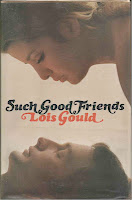Yet another reading round-up. Backlog slowly but surely getting unclogged...
Body Charge by Hunter Davies
Status: Completed
Not so much a good book, more a curious one. A sexually fluid football-playing minicab driver becomes involved in the lives of his clients, particularly those who are or might well be gay. It takes him a while to really get stuck in, however, which is excellent practice for a minicab driver, but doesn't make for great storytelling. Then, when he does, the plot flails in all directions with a murder and a SPOILER ALERT surprise wife thrown in near the end. This novel is more interesting as social history, with skinheads, football hooligans and '70s attitudes to unemployment bobbing about in it. Also, the capturing of the parklife of the time, with enthusiasts spontaneously grouping to play sports or engage in hobbies like model boating in a way they don't today, is fascinating. Read while listening to Badfinger and contemplating James Bolam's face.
The Satyr by Robert DeMaria
Status: Abandoned p. 52
Another entry into the Lost Book sub-genre of the literary sexual confessional, in which a character who is definitely made-up and not the author recounts his experiences, usually involving a lot of precocity and a side-helping of Freudian mother-love/hate. Generally written in the '60s or '70s by serious authors, but nevertheless packaged as soft porn. This one comes with an introduction by Anthony Burgess, who thinks DeMaria is brilliant. Bearing in mind Burgess didn't like his own A Clockwork Orange, we might guess his judgement is a bit off. And it is. This novel is perfectly well written, but it just lacks the charm needed to make you want to hang around a story like this much. There's some main plot where the protagonist wants to kill his mother, but summoning up the energy to care whether he does or not is nigh-on impossible. I'm generally against the book club criticism of the main character being unsympathetic, but in this case... the main character is unsympathetic, and it stops the story from working. Essentially, a seemingly nice guy wanting to do something horrible is a story. Someone unpleasant wanting to do the same, not so much.
The Dolly Dolly Spy by Adam Diment
Status: Abandoned p. 22
Imagine if James Bond was less a weird sadist and more just a bit of a knob, and you'd pretty much have Diment's hero Philip McAlpine. Although he's meant to be a groovy spy, by 1967 he's totally square, dissing teenagers, hippies, rock music and Top of the Pops. Other people still read these books occasionally, which means I don't have to.
Another Part of the House by Winston M. Estes
Status: Completed
Overall, a very fine slice of Americana from a pretty much-forgotten writer. A ten year-old boy grows up in a small Texan town during the Depression, and we encounter the various town characters as they struggle, waiting for the New Deal to kick in. Annoyingly, there's a plot flaw that left me feeling underwhelmed at the end (a confrontation that really needs to happen doesn't) but along the way, it's a warm, poignant portrait of a community, with a segment featuring a death in the family and its aftermath a particular stand-out.
Such Good Friends by Lois Gould
Status: Abandoned p. 51
This story of a dry-witted New Yorker whose husband goes into a coma seemed perfectly good until I hit a plot point I just couldn't get my head around. The doctor instructs her to phone up all her friends and get them to donate blood in order to save him. It ought to be Type O Positive, but it's not essential. This struck me as a bit strange. Surely the doctor's first port of call would be the blood bank? And wouldn't it absolutely have to be the right type of blood? After all, that's the point of having blood types in the first place. I don't know, maybe in '70s New York, blood of varying types was regularly drained from friends and pumped into people, but it doesn't sound right to me. Anyway, I couldn't get past the sheer weirdness of this scenario and bailed.




